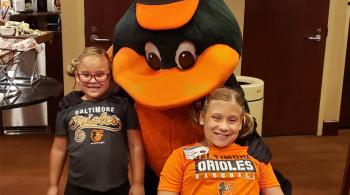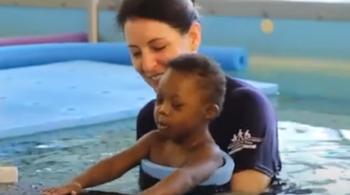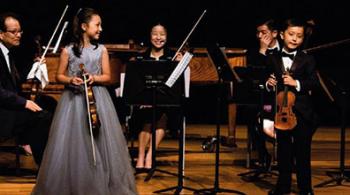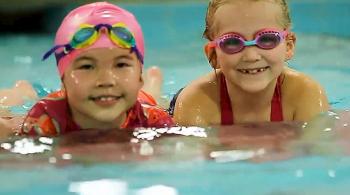By Elisa Mintz Delia, MSW, assistant vice president, operations and clinical programs, at Kennedy Krieger Institute, and Gayle Gross, a senior occupational therapist at the Institute
 While the holiday season can be a magical time for many families, it can also present unique challenges for families of children with special needs. Below are Kennedy Krieger Institute experts’ top tips for helping maximize a child's engagement and enjoyment of holiday festivities. Although every child has his or her own set of needs and abilities, we hope this advice will be able to help you and your family create a season of happy memories to cherish the whole year—and for years to come.
While the holiday season can be a magical time for many families, it can also present unique challenges for families of children with special needs. Below are Kennedy Krieger Institute experts’ top tips for helping maximize a child's engagement and enjoyment of holiday festivities. Although every child has his or her own set of needs and abilities, we hope this advice will be able to help you and your family create a season of happy memories to cherish the whole year—and for years to come.
Holiday preparations: As you prepare for the approaching holidays, consider how the variety of new experiences and changes in routine that often accompany holidays can be adapted to meet your child’s needs. For example:
- If decorating a tree, use ornaments within your child's reach that encourage interaction, such as durable jingle bells that make noise when shaken. Position treasured and breakable ornaments toward the top of the tree for their protection and for your child's safety.
- When hanging lights, consider whether your child may be especially sensitive to light and movement. Non-blinking lights and white lights are the least distracting to the senses.
- Consider alternatives to typical holiday decorations. For example, when using a menorah or candelabra, substitute candles with flameless or battery-operated lighting.
- From baked goodies to freshly cut trees and candles, holiday scents can be overpowering. Be mindful of the array of fragrances in your home, and minimize them if needed.
- Support your child's participation in cooking and baking activities. Even having your child help with the simplest tasks will increase his or her enjoyment and involvement in holiday preparations.
- Use holiday card signing as an opportunity to practice writing skills. For children unable to write, offer a stamp or sticker as a way to sign their name.
Gift selection: During the holiday season, finding the perfect toy for any child can be a challenge, but for family members and friends shopping for a child with special needs, this process can be especially overwhelming. Here are some tips:
- Choose toys based on a child’s interest. Whenever possible, ask the child about what kinds of things he or she likes to play with. If the child can’t express a preference, ask his or her caregiver.
- Choose toys that are engaging and skill-building. Simple, inexpensive toys, such as balls, finger paints, blocks and play dough, can build motor skills and coordination. Board games or toys that involve the whole family help build social skills.
- Buy toys that are developmentally appropriate, or which match the child’s motor and cognitive skill levels. If you don’t know where the child is developmentally, don’t be afraid to ask his or her parents.
- Pick toys and games that can build the child’s self-esteem, and which you know he or she can succeed in. There are many games in which children can succeed without competing against others—they include matching games, puzzles and Lego sets. These games allow children to play alone or with others—and without the pressure of having to score the highest number of points.
Holiday events: The holidays present many opportunities to take part in events within the community, at school, and with family and friends. It is easy to become overextended and feel as though you’re rushing from one place to the next. Stick with events that will be the most meaningful to your family—that way, you’ll have time to make them truly positive experiences. Here are some things to consider:
- A visit to Santa can be exciting for some and scary for others. Prepare your child by talking about the process, or by first watching, from a distance, other children meeting Santa.
- Carefully time your visit to the mall for holiday shopping. Consider weekdays or early weekend mornings, as these hours tend to be less crowded.
- During holiday concerts, children who are sensitive to sound should be seated away from speakers. If necessary, bring earplugs or headphones for those who may need additional noise muffling.
- Before attending holiday parties and family gatherings, let the host know of any food allergies your child may have. Another option is to bring a special allergy-friendly food alternative for your child or to share.
- Before your visit, determine if a location will be accessible to your child. Remember to take into account entrances, bathrooms and activity spaces.
Holiday celebrations: Once preparations are done and preholiday events are over—and the holiday itself has finally arrived!—take time to enjoy the festivities with children, family and friends.
- Children love to open gifts. Gift wrapping should be easy to open. Think: gift bags and stick-on bows!
- Too many gifts at once can be overwhelming. A child may be more comfortable if gift-exchange time is spread out. Allow for playtime with each toy.
- Holidays are filled with visitors, activity and noise. Identify a special spot where your child can go to have some down time.
- Take time throughout the holidays to share the season’s highlights with your child.















